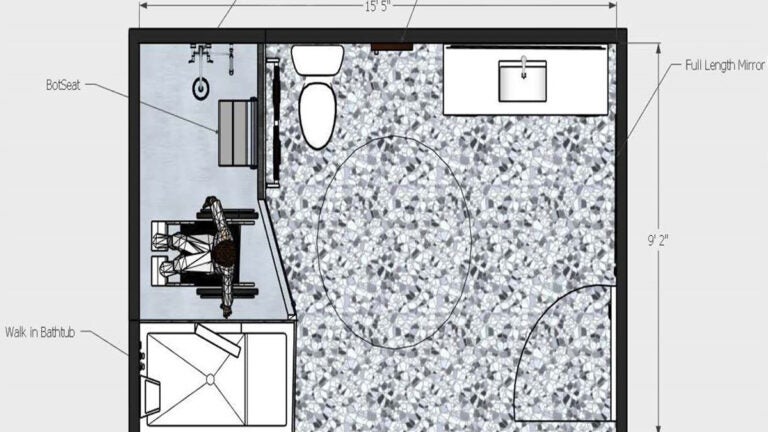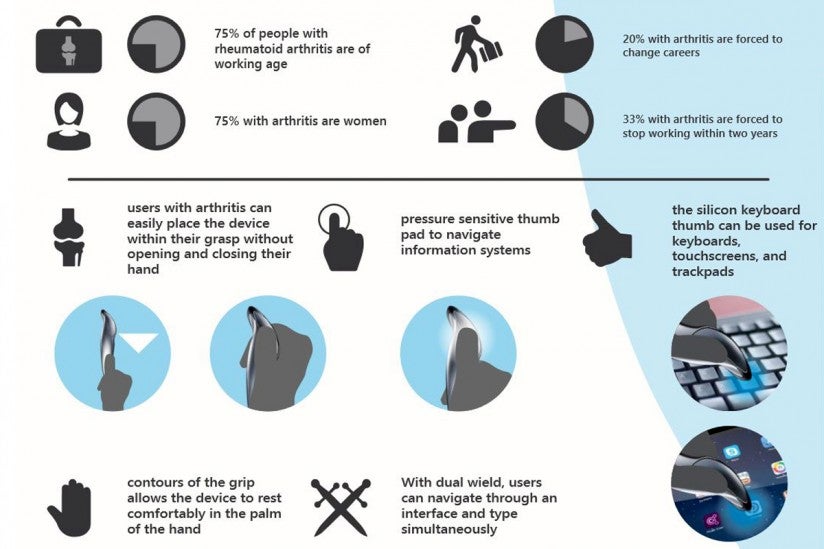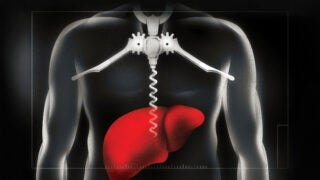
The second-place entry was from Genesis Chavez, who redesigned a bathroom to be wheelchair-friendly. (Image/Courtesy of Genesis Chavez)
Student-designers make spaces, products more accessible
USC Davis competition puts principles of Universal Design to work on everyday items and locations

From a wheelchair-friendly home bathroom to computer equipment that’s easier on arthritic hands, student innovators from across California designed products and spaces to better serve individuals of all abilities for the USC Davis School of Gerontology’s Morton Kesten Universal Design Competition.
Held annually in conjunction with the USC Davis School’s Morton Kesten Summit, the competition promotes using the principles of Universal Design to make everyday items and locations more conducive to independent living and aging-in-place. Competition entrants submitted a poster and design process paper and were judged on several criteria, including their application of Universal Design principles, their research into the market and need for their design, their engagement of potential users, and how they merged their design’s function with aesthetic appeal. The judges included USC Davis School faculty members as well as outside design experts.
Comfortable cursor
This year’s first-place entry, “DAGR: Wield the Cursor,” detailed a wand-like ergonomic device to replace a typical computer mouse for users suffering from arthritis. The DAGR design concept by Adrian Po Villanueva, an industrial design student at California State University, Long Beach, allows users to hold the device in a comfortable loose-fist position, placing a click button and thumb-operated trackpad within easy reach for those with limited hand dexterity. In addition, the tip of the device can be used to press keyboard buttons, and two of the devices can be used simultaneously for additional functionality.
Villanueva, who won a $1,500 prize, said inspiration for the project came from the knowledge that today’s older workers face health problems, including arthritis, that make their everyday work life more difficult and painful.
Helping older adults, people with disabilities, and other individuals maintain their independence is crucial as our society continues to age, said Jon Pynoos, UPS Foundation Professor of Gerontology, Policy and Planning at the USC Davis School and one of the competition’s judges. He pointed out that goal of universal design is to create products and environments that are usable by all persons regardless of their age or abilities.
“Modifications and universal design can allow people to more easily engage in major life activities or even minor tasks,” added contest coordinator and judge Emily Nabors, program manager of the Fall Prevention Center of Excellence.
A better bathroom
The second-place entry was a thoughtful bathroom redesign made for a wheelchair user by Art Institute of California interior design student Genesis Chavez, who received a $1,000 prize. The reimagined space included an expanded floorplan, a lowered medicine cabinet, sink with knee space underneath to accommodate a seated user, a walk-in bathtub and a roll-in shower.

Two projects were selected for honorable mentions:
- Inland Empire Art Institute student Ariella Cedillo presented “Fluidity,” a laundry machine design that automatically moves heavy, wet clothes from the wash into the dryer, utilizes pictorial and audio instructions with a touch screen, and indicates when the laundry process is complete with lights and a melody.
- USC School of Architecture students Yilin Ma, Yidan Hu and Zhou Li presented the “Slide Bathroom,” an innovative design concept with an emphasis on flexible use of space that includes movable wall units and features in a grid system.
“It is my hope that universal design becomes an integral part of all new product, environment and residence design,” said Mary Lou Dauray, one of the competition judges and an environmental artist and advocate for inclusive spaces and universal design. “The Davis School of Gerontology competition reflects a desire among some students to include UD principles in their inspiring design projects.”
The Morton Kesten Summit and Universal Design Competition are endowed by a family member in memory of the late Morton Kesten, an executive of Colonial Penn Insurance Co. at the time it was servicing AARP. The Morton Kesten Summit has historically been convened to address the needs of California’s increasing number of individuals aging in place.



